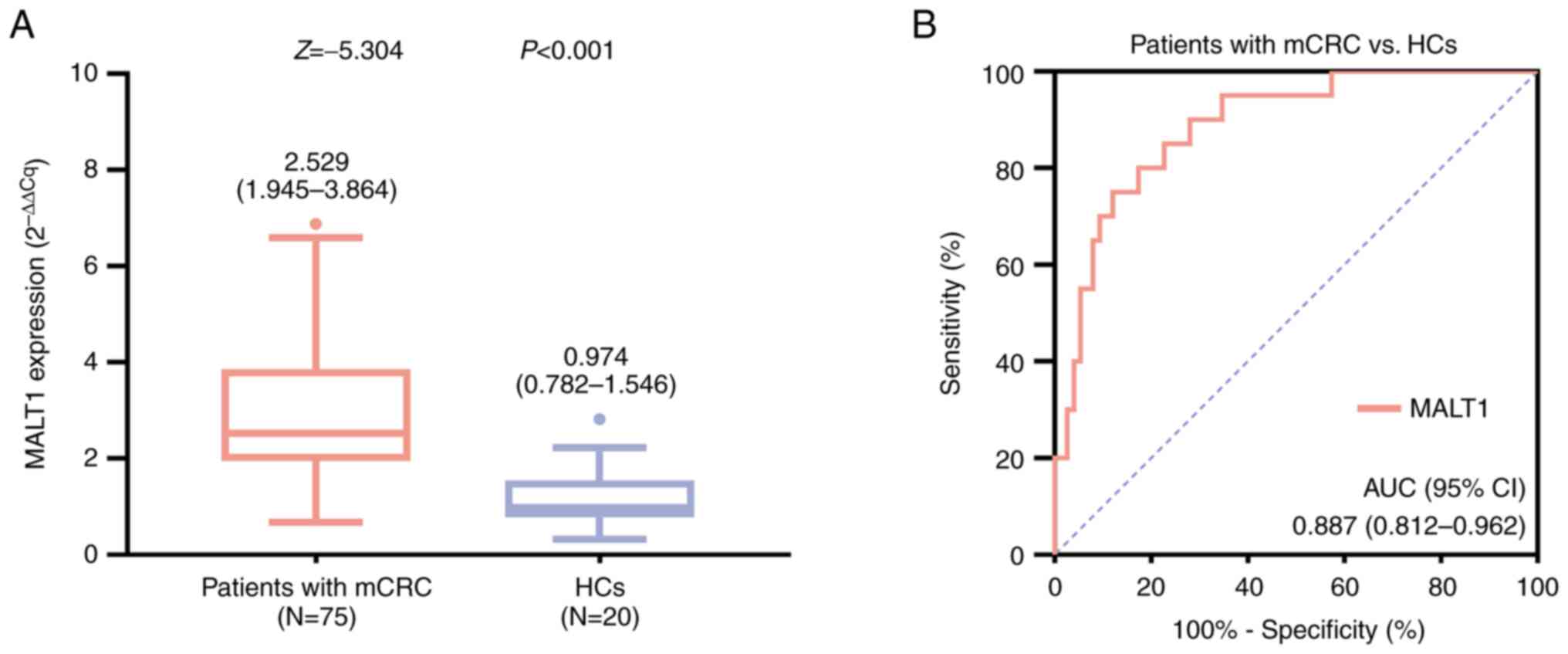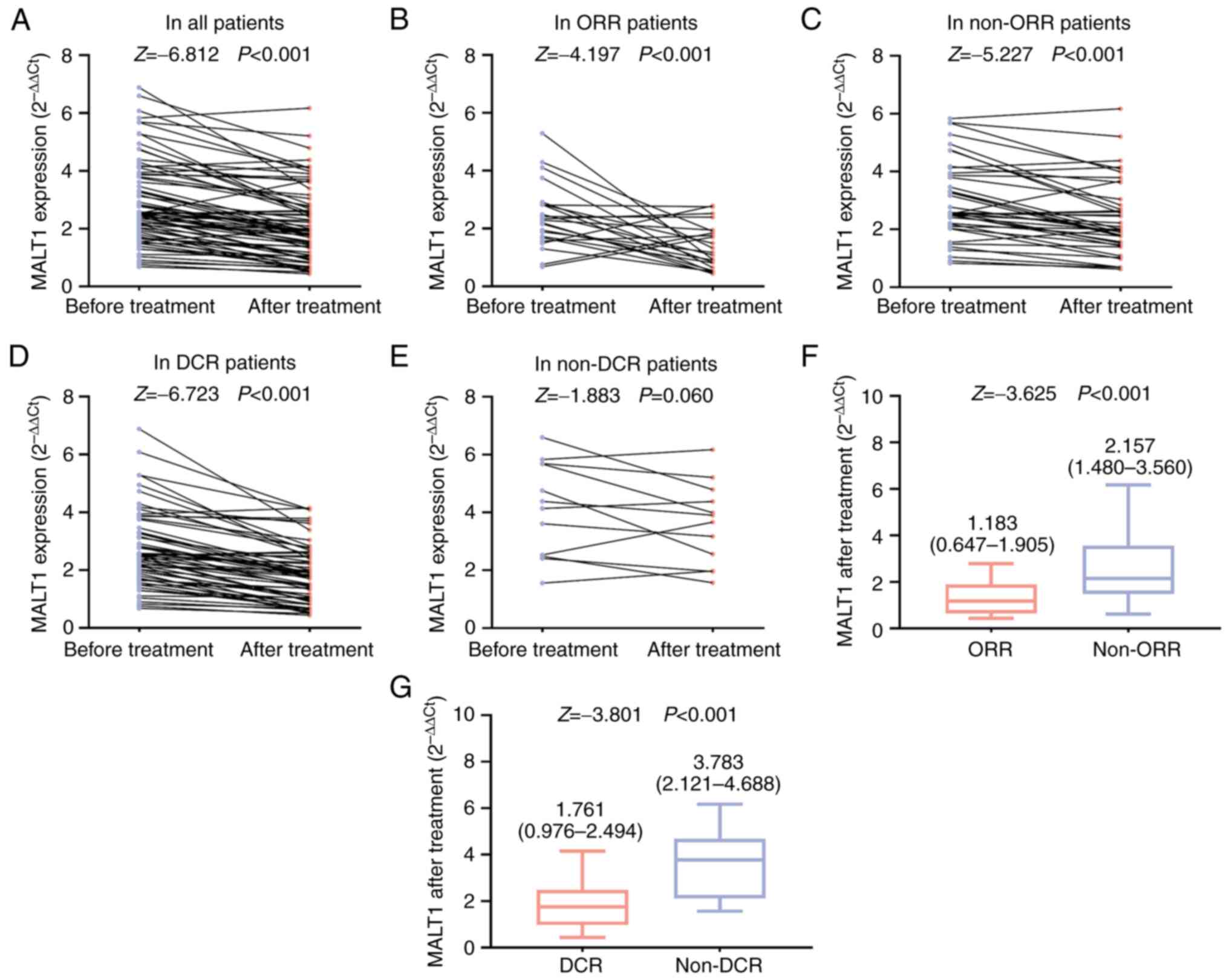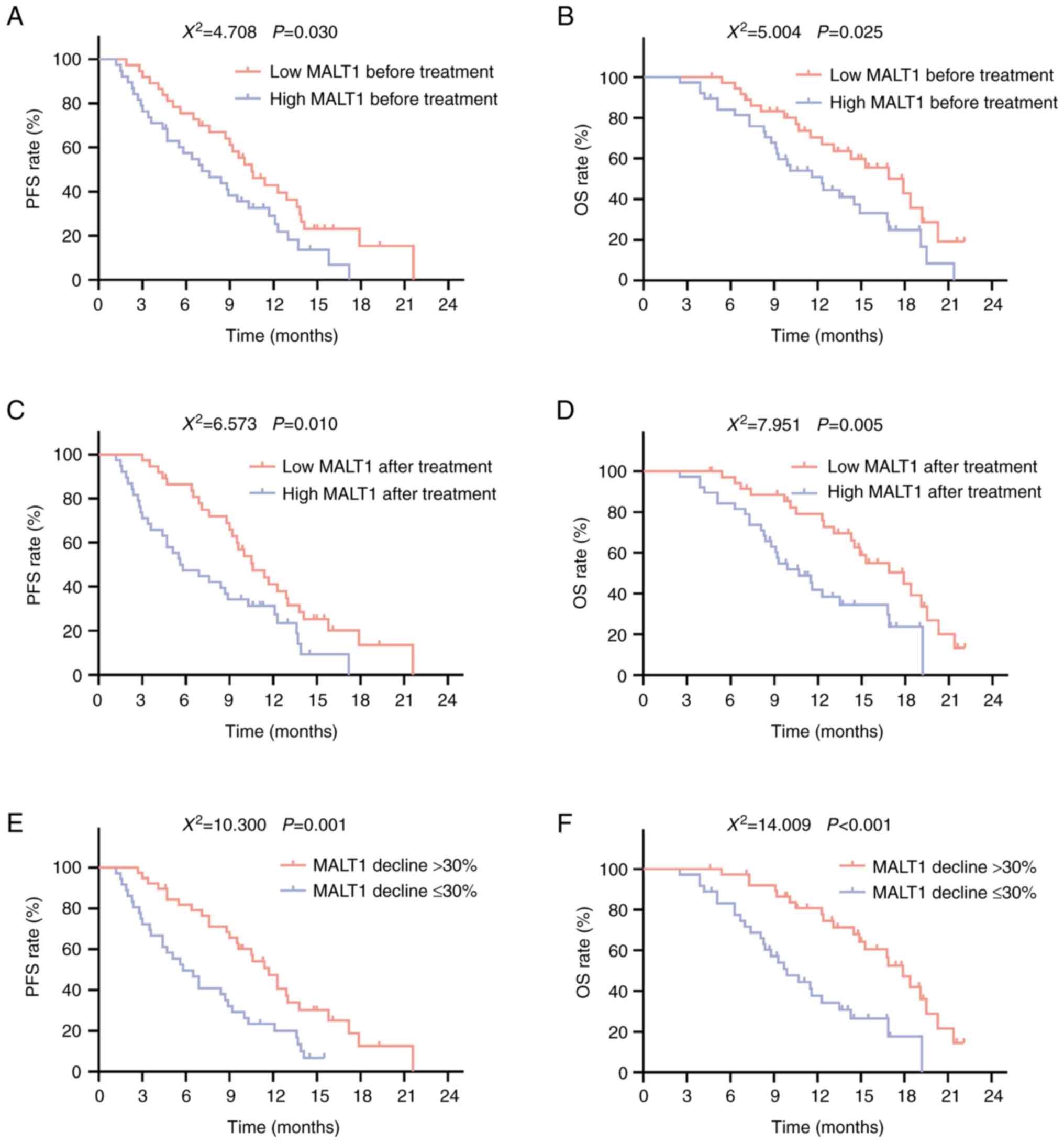|
1
|
You YN, Hardiman KM, Bafford A, Poylin V,
Francone TD, Davis K, Paquette IM, Steele SR and Feingold DL: On
Behalf of the Clinical Practice Guidelines Committee of the
American Society of Colon and Rectal Surgeons: The American Society
of Colon and rectal surgeons clinical practice guidelines for the
management of rectal cancer. Dis Colon Rectum. 63:1191–1222. 2020.
View Article : Google Scholar : PubMed/NCBI
|
|
2
|
Sung H, Ferlay J, Siegel RL, Laversanne M,
Soerjomataram I, Jemal A and Bray F: Global cancer statistics 2020:
GLOBOCAN estimates of incidence and mortality worldwide for 36
cancers in 185 countries. CA Cancer J Clin. 71:209–249. 2021.
View Article : Google Scholar : PubMed/NCBI
|
|
3
|
Carlomagno C, De Stefano A, Rosanova M, De
Falco S, Attademo L, Fiore G and De Placido S: Multiple treatment
lines and prognosis in metastatic colorectal cancer patients.
Cancer Metastasis Rev. 38:307–313. 2019. View Article : Google Scholar : PubMed/NCBI
|
|
4
|
Engstrand J, Nilsson H, Stromberg C, Jonas
E and Freedman J: Colorectal cancer liver metastases-a
population-based study on incidence, management and survival. BMC
Cancer. 18:782018. View Article : Google Scholar : PubMed/NCBI
|
|
5
|
Liu T, Jiang S, Teng X, Zhong L, Liu M,
Jin Y and Dong M: A comparison of panitumumab and cetuximab in the
treatment of KRAS wild-type metastatic colorectal cancer: A
systematic review and meta-analysis. Immunopharmacol Immunotoxicol.
45:1–9. 2022. View Article : Google Scholar : PubMed/NCBI
|
|
6
|
Elmore S: Apoptosis: A review of
programmed cell death. Toxicol Pathol. 35:495–516. 2007. View Article : Google Scholar : PubMed/NCBI
|
|
7
|
Watson AJ: An overview of apoptosis and
the prevention of colorectal cancer. Crit Rev Oncol Hematol.
57:107–121. 2006. View Article : Google Scholar : PubMed/NCBI
|
|
8
|
Liu J, Hong M, Li Y, Chen D, Wu Y and Hu
Y: Programmed cell death tunes tumor immunity. Front Immunol.
13:8473452022. View Article : Google Scholar : PubMed/NCBI
|
|
9
|
Chen Y, Pei Y, Luo J, Huang Z, Yu J and
Meng X: Looking for the Optimal PD-1/PD-L1 Inhibitor in Cancer
Treatment: A comparison in basic structure, function, and clinical
practice. Front Immunol. 11:10882020. View Article : Google Scholar : PubMed/NCBI
|
|
10
|
Li X, Zeng Q, Xu F, Jiang Y and Jiang Z:
Progress in programmed cell death-1/programmed cell death-ligand 1
pathway inhibitors and binding mode analysis. Mol Divers. Aug
10–2022.(Epub ahead of print). View Article : Google Scholar
|
|
11
|
Chen W, Huang Y, Pan W, Xu M and Chen L:
Strategies for developing PD-1 inhibitors and future directions.
Biochem Pharmacol. 202:1151132022. View Article : Google Scholar : PubMed/NCBI
|
|
12
|
Hao S, Zhang X, Han L, Ma X, Nie Y, Deng
J, Zhu H, Liu Q, Ai D, Chen Y, et al: PD-1 inhibitor enhanced
radiosensitivity by reactivating T cells and inducing G2/M phase
arrest in esophageal squamous cell carcinoma. Radiat Res.
198:458–466. 2022. View Article : Google Scholar : PubMed/NCBI
|
|
13
|
Zhou H, Wang Y, Lin Y, Cai W, Li X and He
X: Preliminary efficacy and safety of camrelizumab in combination
with XELOX plus bevacizumab or regorafenib in patients with
metastatic colorectal cancer: A Retrospective study. Front Oncol.
11:7744452021. View Article : Google Scholar : PubMed/NCBI
|
|
14
|
Jiang FE, Zhang HJ, Yu CY and Liu AN:
Efficacy and safety of regorafenib or fruquintinib plus
camrelizumab in patients with microsatellite stable and/or
proficient mismatch repair metastatic colorectal cancer: An
observational pilot study. Neoplasma. 68:861–866. 2021. View Article : Google Scholar : PubMed/NCBI
|
|
15
|
Oliveira AF, Bretes L and Furtado I:
Review of PD-1/PD-L1 Inhibitors in Metastatic dMMR/MSI-H Colorectal
Cancer. Front Oncol. 9:3962019. View Article : Google Scholar : PubMed/NCBI
|
|
16
|
Overman MJ, Lonardi S, Wong KYM, Lenz HJ,
Gelsomino F, Aglietta M, Morse MA, Van Cutsem E, McDermott R, Hill
A, et al: Durable clinical benefit with nivolumab plus ipilimumab
in DNA mismatch repair-deficient/microsatellite instability-high
metastatic colorectal cancer. J Clin Oncol. 36:773–779. 2018.
View Article : Google Scholar : PubMed/NCBI
|
|
17
|
Fan A, Wang B, Wang X, Nie Y, Fan D, Zhao
X and Lu Y: Immunotherapy in colorectal cancer: Current
achievements and future perspective. Int J Biol Sci. 17:3837–3849.
2021. View Article : Google Scholar : PubMed/NCBI
|
|
18
|
Liang X, Cao Y, Li C, Yu H, Yang C and Liu
H: MALT1 as a promising target to treat lymphoma and other diseases
related to MALT1 anomalies. Med Res Rev. 41:2388–2422. 2021.
View Article : Google Scholar : PubMed/NCBI
|
|
19
|
Zhang YY, Peng J and Luo XJ:
Post-translational modification of MALT1 and its role in B cell-
and T cell-related diseases. Biochem Pharmacol. 198:1149772022.
View Article : Google Scholar : PubMed/NCBI
|
|
20
|
Tan H, Xie Y, Zhang X, Wu S, Zhao H, Wu J,
Wang W and Lin C: Integrative analysis of MALT1 as a potential
therapeutic target for prostate cancer and its immunological role
in pan-cancer. Front Mol Biosci. 8:7149062021. View Article : Google Scholar : PubMed/NCBI
|
|
21
|
Qian R, Niu X, Wang Y, Guo Z, Deng X, Ding
Z, Zhou M and Deng H: Targeting MALT1 suppresses the malignant
progression of colorectal cancer via miR-375/miR-365a-3p/NF-κB
Axis. Front Cell Dev Biol. 10:8450482022. View Article : Google Scholar : PubMed/NCBI
|
|
22
|
Yang N, Ji F, Cheng L, Lu J, Sun X, Lin X
and Lan X: Knockout of immunotherapy prognostic marker genes
eliminates the effect of the anti-PD-1 treatment. NPJ Precis Oncol.
5:372021. View Article : Google Scholar : PubMed/NCBI
|
|
23
|
Oken MM, Creech RH, Tormey DC, Horton J,
Davis TE, McFadden ET and Carbone PP: Toxicity and response
criteria of the eastern cooperative oncology group. Am J Clin
Oncol. 5:649–655. 1982. View Article : Google Scholar : PubMed/NCBI
|
|
24
|
Livak KJ and Schmittgen TD: Analysis of
relative gene expression data using real-time quantitative PCR and
the 2(−Delta Delta C(T)) method. Methods. 25:402–408. 2001.
View Article : Google Scholar : PubMed/NCBI
|
|
25
|
Hochster HS, Hart LL, Ramanathan RK,
Childs BH, Hainsworth JD, Cohn AL, Wong L, Fehrenbacher L, Abubakr
Y, Saif MW, et al: Safety and efficacy of oxaliplatin and
fluoropyrimidine regimens with or without bevacizumab as first-line
treatment of metastatic colorectal cancer: Results of the TREE
Study. J Clin Oncol. 26:3523–3529. 2008. View Article : Google Scholar : PubMed/NCBI
|
|
26
|
Chiba T, Soeno Y, Shirako Y, Sudo H,
Yagishita H, Taya Y, Kawashiri S, Okada Y and Imai K: MALT1
Inhibition of oral carcinoma cell invasion and ERK/MAPK Activation.
J Dent Res. 95:446–452. 2016. View Article : Google Scholar : PubMed/NCBI
|
|
27
|
Giordano G, Febbraro A, Tomaselli E,
Sarnicola ML, Parcesepe P, Parente D, Forte N, Fabozzi A, Remo A,
Bonetti A, et al: Cancer-related CD15/FUT4 overexpression decreases
benefit to agents targeting EGFR or VEGF acting as a novel
RAF-MEK-ERK kinase downstream regulator in metastatic colorectal
cancer. J Exp Clin Cancer Res. 34:1082015. View Article : Google Scholar : PubMed/NCBI
|
|
28
|
Corti F, Lonardi S, Intini R, Salati M,
Fenocchio E, Belli C, Borelli B, Brambilla M, Prete AA, Quarà V, et
al: The Pan-Immune-Inflammation Value in microsatellite
instability-high metastatic colorectal cancer patients treated with
immune checkpoint inhibitors. Eur J Cancer. 150:155–167. 2021.
View Article : Google Scholar : PubMed/NCBI
|
|
29
|
Zhao P, Li L, Jiang X and Li Q: Mismatch
repair deficiency/microsatellite instability-high as a predictor
for anti-PD-1/PD-L1 immunotherapy efficacy. J Hematol Oncol.
12:542019. View Article : Google Scholar : PubMed/NCBI
|
|
30
|
Dumont C, Sivars U, Andreasson T, Odqvist
L, Mattsson J, DeMicco A, Pardali K, Johansson G, Yrlid L, Cox RJ,
et al: A MALT1 inhibitor suppresses human myeloid DC, effector
T-cell and B-cell responses and retains Th1/regulatory T-cell
homeostasis. PLoS One. 15:e02225482020. View Article : Google Scholar : PubMed/NCBI
|
|
31
|
Gomez Solsona B, Schmitt A,
Schulze-Osthoff K and Hailfinger S: The Paracaspase MALT1 in
Cancer. Biomedicines. 10:3442022. View Article : Google Scholar : PubMed/NCBI
|


















